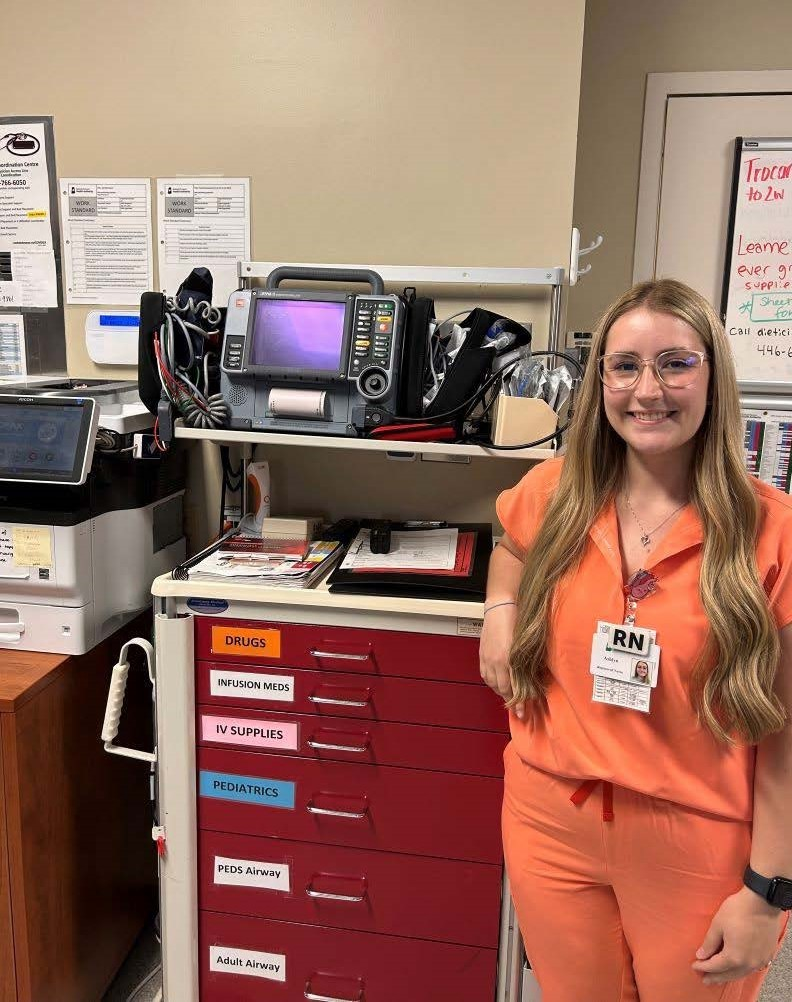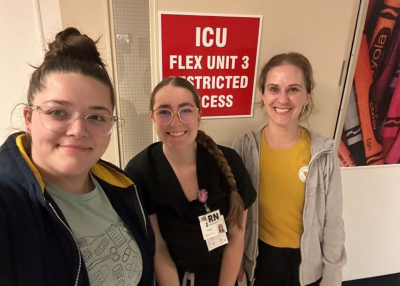Ashlyn Dyok Career Spotlight
Ashlyn Dyok is a Registered Nurse (RN) working in North Battleford, Saskatchewan! Read more about her career journey below!
What area of health care do you work in? Where do you work?
I am a Registered Nurse at Battlefords Union Hospital in the Intensive Care Unit (ICU).
What are you responsible for as a Registered Nurse in Critical Care? Please describe a typical day for yourself.
A typical day starts off by a visual assessment of the room, asking myself “How many IV pumps have infusions going?” which is typically a good indicator of how sick the patient is prior to receiving a verbal report from the previous shift. After receiving the report, I organize my priorities for the patient and make a plan for the day. This includes medication administration, any procedures or tests scheduled, line changes, and mobilization. Health-care team rounds typically start at 9:00 a.m. so ensuring I have my initial assessment complete and have any questions or concerns regarding the patient ready to be addressed at rounds is important. Our ICU team also responds to rapid response requests and codes throughout the hospital, as well as helping other units if there are fewer patients in the ICU.
How is your work-life balance as a Registered Nurse in Critical Care? Please compare your current experience with other jobs you have had in the past.
I am a new graduate nurse from the class of January of 2025 and started the critical care course in February. Now 6 months later, I can say my work life balance has really peaked! All throughout nursing school, I juggled working on top of full-time classes, so now that I am just working, I find my work life balance to be improved. I moved back to my hometown so that I could spend more time doing what I love with my family and friends, which is something that I couldn’t do as often during my education.
Compared to previous work experience, critical care has really opened my eyes to being grateful to be able to take care of myself and has really inspired me to be proactive in this area, especially after a 12-hour shift taking care of individuals who are currently unable to care for themselves. Lately I have been enjoying reading, cooking, and traveling.
Have you always wanted to be a Registered Nurse in Critical Care? Tell us more about your career path!
I was inspired to be a nurse in my early high school days, but I never felt drawn to a specific area of nursing, although I knew I had to start somewhere. In my first semester of nursing school during the fall of 2021, I started working as a Continuing Care Assistant (CCA) at the Saskatchewan Hospital in North Battleford. I floated to many units in the building, most commonly the admissions unit and the secure units within the facility. During my time there, I grew passionate about mental health and could see myself enjoying being an RN at the facility, but when I started working on the Cardiosciences unit and the Cardiac Intensive Care Unit (CICU) at RUH during my final semesters of nursing school, I knew I had found my place. I felt my knowledge grew exponentially on the units, even as a CCA. I was able to tie my knowledge from school to my work and be exposed to taking care of acutely ill patients. It was then that I applied to take my final practicum at the Battlefords Union Hospital ICU where I had two months of preceptorship.
Shortly after passing the national licensing exam, I started the Critical Care Nursing course at Saskatchewan Polytechnic and have been working full time since May.
Are there opportunities to further your career as a Registered Nurse in Critical Care?
As a critical care nurse there are often workshops or conferences where education and discussions take place to help you continue building your foundation of knowledge. In terms of furthering your career, having critical care experience as a nurse is a prerequisite for the STARS Air Medical Crew or to become a perfusionist.
Do you have any advice for students or new graduates looking to pursue a career as a Registered Nurse in Critical Care? Are there specialty areas that are in more demand than others?
If a nurse or student is interested in critical care, take the jump and try it!
I found there was (and still is) a steep learning curve, but I find it motivating to keep learning and advancing my knowledge as a new graduate nurse. I think the need for critical care nurses is hard on the health-care system as it means a shortage of critically trained nurses to take care of critically acute patients. If you would like to join our team – reach out today!
What is the number one thing you love about being a Registered Nurse in Critical Care?
The feeling of making a difference. Whether that is the early identification of the patient deteriorating so the team can intervene or providing end of life care, knowing that the direct care provided was for the greater good of the patient and their family is what I love in this role.




